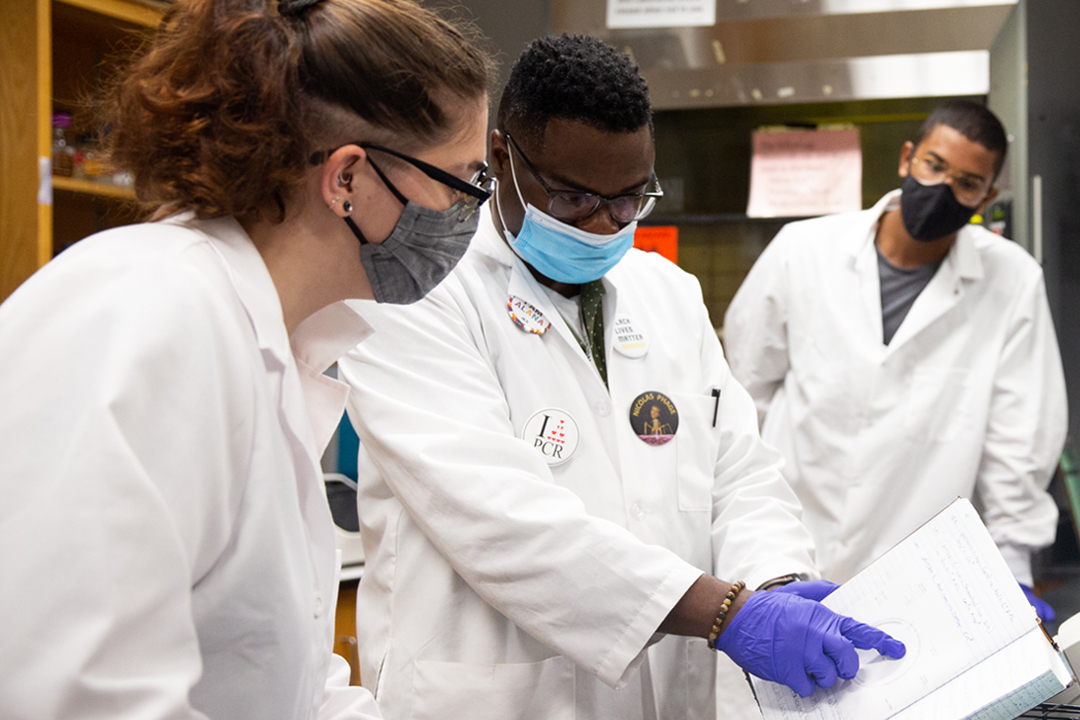André Hudson: Encouraging Tomorrow’s Scientists, One Person and One Paper at a Time
Jaime Huynh, RIT Student
Dr. Hudson works in the lab with students Wilford Burke and Jo Melita to choose bacterial strains from the Hudson Lab strain file. This work will facilitate upcoming experiments for the lab component of the course, Fundamentals of Plant Biochemistry and Pathology.
French poet, Anatole France, is quoted as saying, “Nine tenths of education is encouragement.” If you’ve ever met Dr. André Hudson, you may understand what France was talking about.
As the Head of the Thomas H. Gosnell School of Life Sciences, Hudson fosters a unique experiential learning environment for students majoring in biology, bioinformatics, biotechnology, and environmental science. He also teaches courses in topics such as plant biochemistry and pathology and genomics, and runs a lab where students are afforded research opportunities leading to co-authorships on peer-reviewed publications. Students note that one thing Hudson always insists upon is the importance of science dissemination and communication. That’s why Dr. Hudson’s new role is so notable.
Starting in January 2021, Dr. Hudson will join academics from universities like Harvard, MIT, and Yale on the Editorial Board of the Journal of Biological Chemistry (JBC). As a member of the JBC's Editorial Board, Hudson will have the opportunity to shape and represent the journal in many ways. He will evaluate manuscripts for publication and be expected to keep an eye out for papers and presentations that should be brought to the attention of JBC Associate Editors or staff.
Similar to his role mentoring students, Dr. Hudson will “provide detailed reviews for authors to both strengthen their efforts and ensure the integrity of the scientific literature,” according to the JBC.
It’s often said that in Dr. Hudson’s lab students don’t learn what to think, they learn how to think. Graduate Spencer Richman, ‘20, bioinformatics and computational biology, described the soup-to-nuts process he experienced during a project with Dr. Hudson:
“While working on this project, we learned the intricacies of genomic research, ranging from experimental design, to sample preparation, to bioinformatics analysis of the resulting data, and finally to the writing and peer-review process.”
But it goes beyond completing a project. Marissa Schroeter, ‘22, biotechnology and molecular bioscience, shares how dedicated Dr. Hudson is in ensuring his students are set up for long-term success:
“I appreciate how hard Dr. Hudson works to make sure that students in his lab get the opportunity to see the publishing process, and have the potential for getting their name on a paper for a project they worked on.”
It’s no wonder, then, that Hudson would be invited to the five-year appointment with the JBC. Amid the lab work, writing practice, and teaching classes, Hudson will now be able to share his expertise and encouragement with researchers around the world.
“Dr. Hudson is one of those professors that does more than just teach; he coaches and mentors every step of the way.” - Jonathan Chu, ‘21 biotechnology and molecular bioscience
Since joining the faculty within the College of Science, Dr. Hudson has secured approximately $1.3 million in federally funded grants and contracts as Principal Investigator (PI) or Co-PI from the National Institute of Health, National Science Foundation, Bayer Corporation, Sweetwater Energy and Natcore Technology. Dr. Hudson has published 72 peer-reviewed articles, 5 book chapters, and presented more than 36 conference presentations.
Hudson was born in Jamaica and came to the U.S. when he was 14 years old. He fell in love with science as an undergraduate student researcher in the laboratory of Dr. Anthony Madu at Virginia Union University where he performed research aimed at identifying pathogenic bacteria from fresh farm produce. Today Hudson shares that opportunity to fall in love with science in his own lab primarily focusing on two main areas: the kinetic and structural aspects of enzymes involved in amino acid metabolism that are attractive targets for biocide development and plant-microbial interactions focusing on fungal and bacterial genomics.
Learn More:
· Dr. André Hudson Bio
· The Hudson Lab
· Thomas H. Gosnell School of Life Sciences









